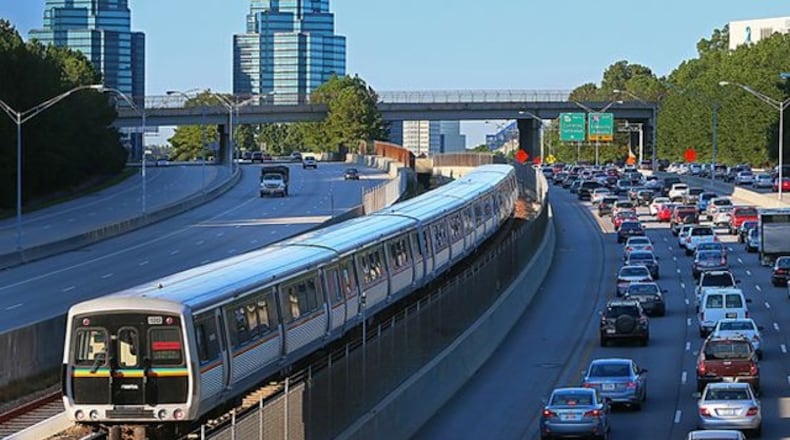Metro Atlanta residents increasingly see public transportation as the best way to tackle the region’s thorny traffic problems – and a majority are willing to pay higher taxes to cover the cost.
Nearly half – 49 percent – of respondents in a 13-county area say expanding transit is the best way to address traffic congestion, according to an Atlanta Regional Commission poll to be released today. By comparison, just 27 percent say improving roads and highways is the best traffic solution, the poll found.
The region’s residents are significantly more likely to embrace transit than a few years ago. Just 41 percent of respondents said transit was the best option in 2013.
The survey results come as Fulton and Gwinnett counties prepare to take transit initiatives to voters next year. They appear to offer good news for supporters of those initiatives: About 56 percent of residents in both counties said they're willing to pay higher taxes to expand regional transit. More than half – 51 percent – of residents in the entire region said they'd pay more.
Still, Gwinnett County Commission Chairwoman Charlotte Nash advised caution when interpreting the ARC poll results. She noted the survey did not target likely voters, so it may not predict the results of a referendum.
“When faced with specific proposed projects and the required wording for ballot questions, there is a tendency for support to be lower,” Nash said. “However, there is no doubt that transit options are considered important by a larger number of residents than ever before.”
Since voters defeated a $7.2 billion regional roads and transit measure in 2012, support for mass transit has been gaining momentum in metro Atlanta. In addition to Fulton and Gwinnett, Cobb County has begun a transit study that could lead to a public vote. DeKalb County is mulling its options for a MARTA expansion on I-20. And Atlanta and Clayton County are deciding how to spend billions of dollars for transit that voters have already approved.
Other communities also are examining their transit needs.
The Aerotropolis Atlanta Community Improvement Districts plan to spend the next year studying ways transit can improve traffic around Hartsfield-Jackson International Airport. Executive Director Gerald McDowell said the study will capitalize and expand on the plans under development in Fulton and Clayton counties.
McDowell said he believes the metro area is starting to recognize the importance of mass transit, especially for economic development.
“We’re all connected. But we’re connected poorly,” he said. “We need better connections.”
Meanwhile, the General Assembly is discussing state funding for mass transit – a prospect that not long ago seemed unlikely.
ARC Executive Director said the survey results should ease the minds of elected officials who may have been reluctant to discuss transit in the past.
“It doesn’t mean their voters are going to adopt transit or pay for it,” Hooker said. “But it’s safe to have that conversation, and you’re not going to get beat up at the polls.”
The survey was conducted by the A.L. Burruss Institute of Public Service and Research at Kennesaw State University. It questioned nearly 5,500 residents by telephone. The region-wide results come with a margin of error of 1.3 percent, though that margin for individual counties range from 4 to 7 percent.
It’s the fifth year the ARC has conducted its “Metro Atlanta Speaks” survey. Among the latest findings:
- A plurality of metro residents – 27.2 percent – say transportation is the region's biggest problem, followed by crime (16.9 percent), public education (11.5 percent), human services (9.3 percent) and the economy (9.2 percent). It's the fourth straight year residents have named transportation their top concern.
- About three out of every four residents said improved public transportation was "very important" to metro Atlanta's future – up slightly from last year. Another 19.6 percent said it was "somewhat important."
- About a third of residents said the collapse of I-85 in Buckhead last spring changed the way they traveled, with most (21 percent) saying they changed their travel or work schedule. Just 2.9 percent said the highway collapse led them to take transit, though most didn't stick with it.
- About 27 percent of residents said they frequently lack transportation to get where they need to go.
Echoing a finding from last year's poll, only 52 percent of metro residents said they'd be able to cover a $400 emergency with cash, a check or debit card. Others (about 31 percent) said they'd pay with a credit card, borrow the money or pawn or sell something to cover the cost, while 14 percent said they would not be able to handle a $400 emergency.
Hooker said it’s troubling that so many residents are “living on the margins.”
Poll: Transit the best traffic solution
An Atlanta Regional Commission poll to be released Friday shows 48.8 percent of respondents in a 13-county area say expanding public transit is the best long-term solution to the region’s traffic problems, compared to 27.4 percent who say improving roads and highways is the best solution. The chart shows the percentage of respondents in each county who say transit is the best solution.
Butts: 38.7
Cherokee: 40.5
Clayton: 46.4
Cobb: 52.4
Coweta: 46.8
DeKalb: 52.7
Douglas: 42.1
Fayette: 43.2
Fulton: 53.9
Gwinnett: 45.2
Henry: 37.7
Paulding: 44.6
Rockdale: 43.3
SOURCE: Atlanta Regional Commission
MYAJC.COM: REAL JOURNALISM. REAL LOCAL IMPACT.
The AJC's David Wickert keeps you updated on the latest in what's happening with transportation in metro Atlanta and Georgia. You'll find more on myAJC.com, including these stories:
Never miss a minute of what's happening in Atlanta transportation news. Subscribe to myAJC.com.
About the Author
Keep Reading
The Latest
Featured




